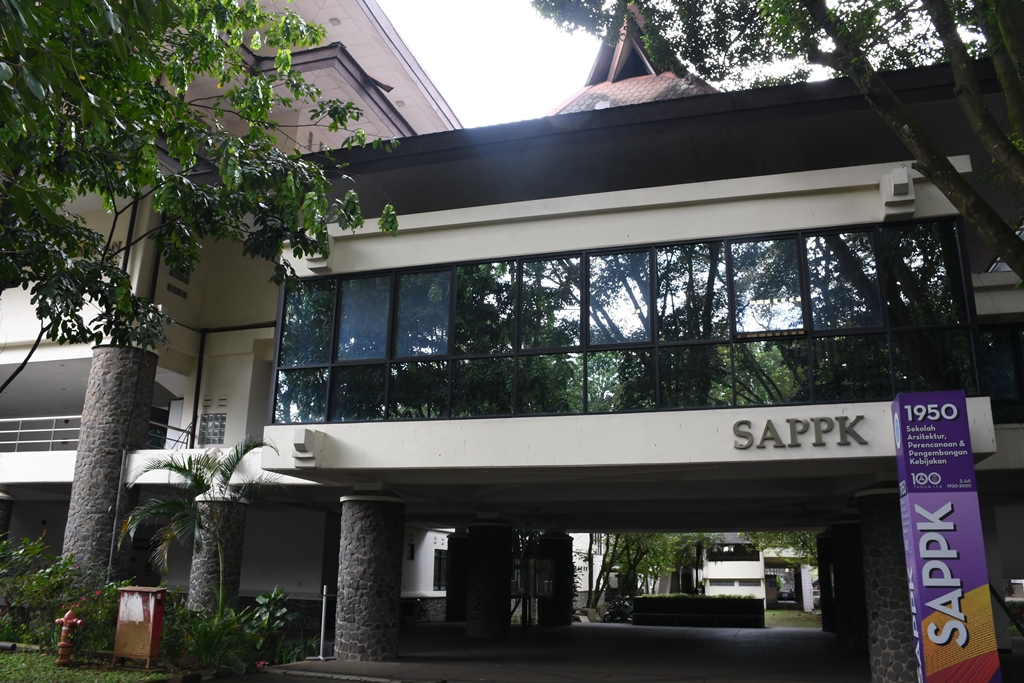Background
The ITB School of Architecture, Planning and Policy Development (SAPPK) was established on August 29, 2005, based on the ITB Rector's Decree on the Management of Academic Units in the ITB Environment, to reorganize ITB's academic units. The number of Faculties / Schools was originally 7 (seven) to 11 (eleven). However, the constituent elements of the SAPPK are not new, because all academic programs and resources come from two departments that were originally under the Faculty of Civil Engineering and Planning (namely: Architecture, Regional and Urban Planning) and two study programs that were originally under the auspices of the Faculty of Civil Engineering and Planning. under the Faculty of Industrial Engineering (namely: Development and Transportation Studies).
SAPPK ITB has been actively operating since January 1, 2006 as an academic implementation unit that is responsible for carrying out educational, research and community service activities. SAPPK has 12 (twelve) study programs ranging from undergraduate to doctoral education strata, 9 (nine) expertise groups, 114 (one hundred and fourteen) academic staff, and 57 (fifty seven) non-academic staff (as of 01 June 2019) , and 1,178 students of undergraduate, master and doctoral programs (condition 1 June 2019).
SAPPK ITB has the mandate to foster and develop scientific knowledge, culture and a conducive academic community, as well as networks and international cooperation initiatives.
Vision
Developing educational programs in the field of planning, designing and developing built environment policies, which are able to foster creative and critical thinking skills as well as ethical and responsible attitudes to graduates, so that they are ready to become reliable professionals, entrepreneurs, leaders and agents of change in society
Mission
- Creating graduates with characters and qualifications that are relevant to the needs of the future world
- Organizing productive educational programs with innovative learning methods
- Organizing international standard education programs in the field of planning, designing and developing sustainable built environment policies
- Increase the accessibility of educational programs for the best talents from various regions and levels of society.
The Strategic Education Sector Program is as follows
- Build a positive brand image to foster trust and maintain customer loyalty in an increasingly competitive education market.
- Establishment of applied and scientifically oriented master's programs as well as professional programs to meet the demands of scientific development and the job market.
- intensification of educational cooperation with various government agencies and universities abroad
- Setting targets and developing a monitoring and evaluation framework for quality assurance of education and teaching
- Proposing standard unit costs (unit cost) for various components of educational and teaching activities.
Study Program
SAPPK ITB offers 12 (twelve) educational programs with the following strata
• Urban and Regional Planning (Bachelor, Master, Doctor)
• Architecture (Bachelor, Master, Doctor)
• Urban Design (Masters)
• Development Studies (Masters)
• Transportation (Master, Doctor)
• Tourism Planning (Masters)
• Landscape Architecture (Masters)
Research Groups
In the development of knowledge, science and human resources, SAPPK ITB is supported by 9 (nine) Expertise Groups (KK) with the following fields of study:
1. Regional and Rural Planning (PWD)
- Planning and Development of Metropolitan Areas - Planning and Development of Underdeveloped Areas - Strengthening of Core-Periphery Relationships - Management of the Indonesian Maritime Continent (BMI)
2. Urban Planning and Design (PPK)
- Academic Concept of Urban Planning Standards - Housing and Land Development in Urban Areas - Peri-Urban Development - Development of an Urban Economic Base
3. Regional and City Infrastructure System (SIWK)
- Infrastructure System Engineering and Sustainability of Regional and City Development - Institutional Development and Infrastructure Development Financing - Development of Access to Infrastructure Services
4. Management of Development and Policy Development (P2PK)
– Metropolitan Management- Strategic Planning and Management- Disaster Management- Public Sector Management- Public Policy Analysis
5. Architectural Design (PA)
- Environmental and Cultural Design - High Density Housing - Digital Architecture
6.Building Technology (TB)
- Appropriate Building Technology - Energy Efficient Buildings
7. Housing and Settlements (PP)
- Morphology, Settlement Transformation and Occupancy Processes- Housing Development and Residential Feasibility Processes- Demands, Needs and Preferences of the Settlement Environment- Community-Based Housing and Settlement Planning
8. History, Theory and Criticism of Architecture (STK)
- Cultural Transformation of Residing - Contemporary Architecture and Lifestyle - Indonesian Architectural Historiography
9. Economic Modeling and Systems (SPE)

